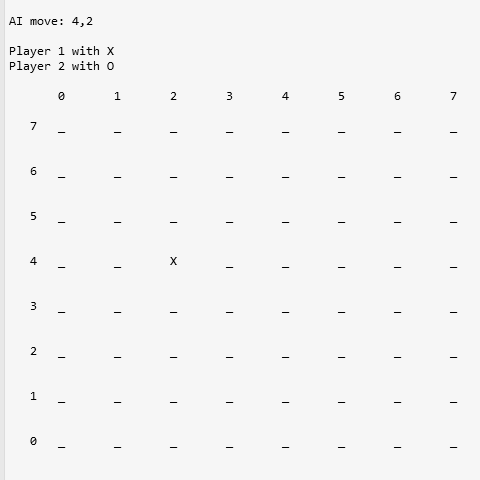This is an implementation of the AlphaZero algorithm for playing the simple board game Gomoku (also called Gobang or Five in a Row) from pure self-play training. The game Gomoku is much simpler than Go or chess, so that we can focus on the training scheme of AlphaZero and obtain a pretty good AI model on a single PC in a few hours.
References:
- AlphaZero: Mastering Chess and Shogi by Self-Play with a General Reinforcement Learning Algorithm
- AlphaGo Zero: Mastering the game of Go without human knowledge
To play with the trained AI models, only need:
- Python >= 2.7
- Numpy >= 1.11
To train the AI model from scratch, further need, either:
- Theano >= 0.7 and Lasagne >= 0.1
or - PyTorch >= 0.2.0
or - TensorFlow
PS: if your Theano's version > 0.7, please follow this issue to install Lasagne,
otherwise, force pip to downgrade Theano to 0.7 pip install --upgrade theano==0.7.0
If you would like to train the model using other DL frameworks, you only need to rewrite policy_value_net.py.
To play with provided models, run the following script from the directory:
python human_play.py
You may modify human_play.py to try different provided models or the pure MCTS.
To train the AI model from scratch, with Theano and Lasagne, directly run:
python train.py
With PyTorch or TensorFlow, first modify the file train.py, i.e., comment the line
from policy_value_net import PolicyValueNet # Theano and Lasagne
and uncomment the line
# from policy_value_net_pytorch import PolicyValueNet # Pytorch
or
# from policy_value_net_tensorflow import PolicyValueNet # Tensorflow
and then execute: python train.py (To use GPU in PyTorch, set use_gpu=True and use return loss.item(), entropy.item() in function train_step in policy_value_net_pytorch.py if your pytorch version is greater than 0.5)
The models (best_policy.model and current_policy.model) will be saved every a few updates (default 50).
Note: the 4 provided models were trained using Theano/Lasagne, to use them with PyTorch, please refer to issue 5.
Tips for training:
- It is good to start with a 6 * 6 board and 4 in a row. For this case, we may obtain a reasonably good model within 500~1000 self-play games in about 2 hours.
- For the case of 8 * 8 board and 5 in a row, it may need 2000~3000 self-play games to get a good model, and it may take about 2 days on a single PC.
My article describing some details about the implementation in Chinese: https://zhuanlan.zhihu.com/p/32089487
